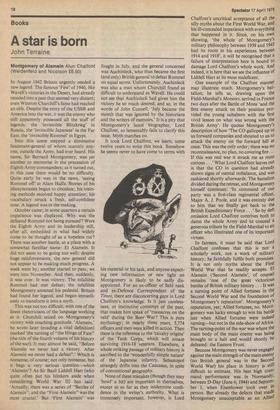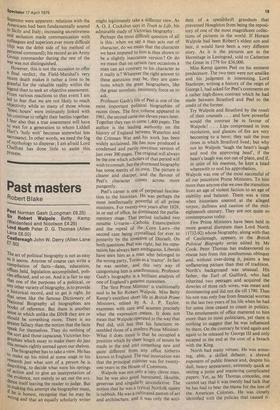Books
A star is born
John Terraine
Montgomery of Alamein Alun Chalfont (Weidenfeld and Nicolson £6.50)
In August 1942 Britain urgently needed a new legend. The famous 'Few' of 1940, like WaveII's victories in the Desert, had already receded into a past that seemed very distant; even Winston Churchill's fame had reached an ebb. Despite the entry of the USSR and America into the war, it was the enemy who still apparently possessed all the stuff of legends: the invincible Blitzkrieg' in Russia, the Invincible Japanese' ita the Far East, the 'invincible Rommel' in Egypt.
Into this scene stepped a diminutive lieutenant-general of whom scarcely anyone, outside the Army, had ever heard. His name, Sir Bernard Montgomery, was yet another to memorise in the procession of Eighth Army commanders; as it turned out, in this case there would be no difficulty. Quite early he was in the news, `seeing Rommel off' at Alam Haifa. Stories of his idiosyncrasies began to circulate; his training methods received happy attention; his vocabulary struck a fresh, self-confident note. A legend was in the making.
October came; in some quarters a certain impatience was displayed. Why was the defeated Rommel not being pursued ? Were the Eighth Army and its leadership still, after all, embedded in what had widely come to be thought of as a hopeless rut? There was another battle, at a place with a somewhat familiar name: El Alamein. It did not seem to be going too well; despite huge reinforcements, the new general did not appear to be making much progress. A week went by; another started to pass; we were into November. And then, suddenly, it was over. It was victory. The infallible Rommel had met defeat; the infallible Montgomery annexed his pedestal. Britain had found her legend, and began immediately to transform it into a myth.
This was not too difficult, with one of the finest rhetoricians of the language working at it. Churchill seized on Montgomery's victory with touching gratitude. 'Alamein,' he wrote later (evading a vital definition) marked 'the turning of "the Hinge of Fate" (the title of the fourth volume of his history of the war). It may almost be said, "Before Alamein we never had a victory. After Alamein we never had a defeat": Which is nonsense, of course; not only nonsense, but it begs a very serious question—which 'Alamein'? As Sir Basil Liddell Hart (who quite often put his blinkers aside when considering World War II) has said: 'Actually, there was a series of "Battles of Alamein", and the "First Alamein" was the most crucial.' But `First Alamein' was fought in July, and the general concerned was Auchinleck, who thus became the first (and only) British general to defeat Rommel on equal terms. Unfortunately, Auchinleck was also a man whom Churchill found as difficult to understand as Wavell. He could not see that Auchinleck had given him the victory he so much desired, and so, in the words of John Connell, `July became the month that was ignored by the historians and the writers of memoirs.' It is a pity that Montgomery's latest biographer, Lord Chalfont, so lamentably fails to clarify this issue. Myth marches on.
It took Lord Chalfont, we learn, some twelve years to write this book. Somehow he seems never to have come to terms with
his material or his task, and anyone expecting new information or new light on Montgomery is likely to be sadly disappointed. For an ex-officer of field rank and ex-Defence Correspondent of the Times, there are disconcerting gaps in Lord Chalfont's knowledge. Is it just carelessness, or instinctive contempt of the past, that makes him speak of 'massacres on the veld' during the Boer War? This is pure mythology ; in nearly three years, 5,774 officers and men were killed in action. Then there is the reference to the `cavalry origins' of the Tank Corps, which will amaze surviving 1916-18 veterans. Elsewhere, a whole striking passage of military history is ascribed to the 'wonderfully simple nature' of the Japanese infantry. Sebastopol strangely drifts into the Caucasus, in spite of conventional geography.
None of these mistakes (though they may `howl' a bit) are important in themselves, except in so far as they undermine confidence in the writer's authority. What is immensely important, however, is Lord Chalfont's uncritical acceptance of all the silly myths about the First World War, and his ill-concealed impatience with everything that happened in it. Since, on his own showing, 'the whole of Montgomery's military philosophy between 1939 and 1945 had its roots in his experiences between 1914 and 1918', it will be recognised that a failure of interpretation here is bound to damage Lord Chalfont's whole work. And indeed, it is here that we see the influence of Liddell Hart at its most maleficent.
One example of the Chalfont manner may illustrate much. Montgomery's battalion, he tells us, drawing upon the Field-Marshal's Memoirs, arrived in France two days after the Battle of Mons 'and the first enemy attack on their position provided the young subaltern with the first vivid lesson on what was wrong with the British Army'. He quotes Montgomery's description of how `The CO galloped up to us forward companies and shouted to us to attack the enemy on the forward hill at once. This was the only order; there was no reconnaissance, no plan, no covering fire . • • If this was real war it struck me as most curious ...' What Lord Chalfont leaves out is that the CO in question had already shown signs of mental imbalance, and was cashiered shortly afterwards. The battalion divided during the retreat, and MontgomerY himself continues: 'In command of our party was a first-class regimental officer, Major A. J. Poole, and it was entirely due to him that we finally got back to the British Expeditionary Force. . .' So by deft omission Lord Chalfont contrives both to damn the whole Army and to conceal a generous tribute by the Field-Marshal to an officer who illustrated one of its important virtues.
In fairness, it must be said that Lord Chalfont confesses that this is not a scholarly work, nor a work of military history; he faithfully fulfils both promises. It is not only myths about the First World War that he readily accepts. El Alamein ('Second Alamein', of course) remains 'one of the great victorious battles of British military history . . . It was a turning point of Allied fortunes in the Second World War and the foundation of Montgomery's reputation'. Montgomery's reputation, yes; Allied fortunes, no. Montgomery was lucky enough to win his battle just when Allied fortunes were indeed turning—but not in the side-show of Africa. The turning-point of the war was where the main body of the main enemy was being brought to a halt and would shortly be defeated: the Eastern Front.
Because Montgomery was never engaged against the main strength of the main enemy (no British general was in the Second World War) his place in history is still difficult to estimate. His best high command performance was in NormandY, between D-Day (June 6, 1944) and September 1, when Eisenhower took over In person. But already the defects that made Montgomery unacceptable as an Allied
SuPremo were apparent: relations with the Americans had been fundamentally soured in Sicily and Italy; increasing secretiveness and seclusion made communication with Colleagues and superiors ever more difficult (this was the debit side of his method of Personal command); his record as an Army Group commander during the rest of the War was not distinguished.
However, this is not the occasion to offer a final verdict; the Field-Marshal's very recent death makes it rather a time to be grateful for the valuable reality within the legend than to seek an objective assessment. From various reactions to that event I am led to fear that we are not likely to reach Objectivity while so many of those whose 'finest hours' were intimately linked with his continue to refight their battles together. 'fear also that a true assessment will have 10 wait for a generation to whom Liddell Hart's 'holy writ' becomes somewhat less sacrosanct. In other words, we need the fog Of mythology to disperse; I am afraid Lord Chalfont has done little to assist this Process.



































 Previous page
Previous page